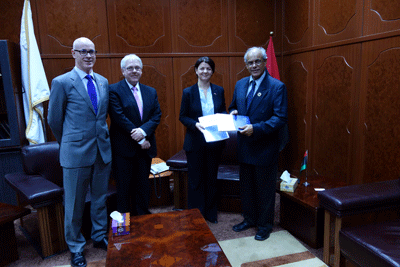The International Centre for Prison Studies has been working in Libya since 2004 on a project to bring prisons in Libya up to international standards. This work has been funded by the UK Foreign and Commonwealth Office through its Programme for Human Rights and Democracy.
The project has had three main objectives:
- To increase awareness in the Libyan prison administration about the international standards which apply to the use of imprisonment.
- To assist the Libyan prison administration in assessing how far conditions in the country’s prisons fall short of international standards.
- To assist the Libyan prison administration in implementing a programme of reform to bring its prisons up to international standards.
At the outset of the project prisons in Libya were under the control of the Ministry of Public Security and Justice. Shortly after the project began responsibility for prisons was transferred to the Ministry of Justice. This was one the first positive outcomes of the project.
The main activities of the ICPS project have been to assist the prison administration in developing:
- a strategic plan for prison reform throughout the country.
- a programme of prison staff training in the humane treatment of prisoners.
- An improvement of living conditions in prisons
- A rehabilitation programmes for prisoners, particularly in education and work.
During the last six years experts from ICPS have visited all of the 36 prisons under the control of the Ministry of Justice. Senior Libyan prison staff have visited prisons in England to observe good practice.
The Ministry of Public Security now retains control of two prisons, Abu Salim and Ain Zara. ICPS has not been involved in these prisons. Last year it was announced that the government intended to transfer these two prisons to the Ministry of Justice but this has not yet happened.
The final activities of the initial six year project were due to take place in Libya between 14 and 24 February 2011. The work of the first week went ahead as planned and included an evaluation of the project carried out by Dr Silvia Casale, former President of the European Committee for the Prevention of Torture and first Chairperson of the United Nations Sub-Committee for the Prevention of Torture.
However, on Friday 18 February 2011 Libyan officials in the Ministry of Justice strongly advised the ICPS experts that they should leave the country, which they did the following day. The former Minister of Justice, who was a key supporter of the project, subsequently resigned and went to Benghazi. There followed the Libyan revolution and the overthrow of President Gaddafi.
In December 2011, the new Libyan Minister of Justice, acknowledging the reforming initiatives of ICPS, made a special request to the UK Ambassador to invite ICPS to return to Libya and to help the new administration to re-establish control of prisons and prisoners under the authority of the Judicial Police. ICPS carried out a scoping visit in February 2012 and thereafter two further phases of work between March 2012 and March 2013.
From May to October 2013 our associate Dr. Shane Bryans was based in Tripoli as Justice Advisor to the Minister of Justice. Shane provided support, advice, and training to the Judicial Police on prison and court reform. He also developed training materials for JP staff, including workbooks on ‘Working with Women in Prison’ and on ‘Prison Security for Prison Directors’. Shane’s work, built upon the foundations laid during earlier ICPS projects, continues to inform initiatives for establishing the rule of law in what continues to be a highly fragile situation in the new Libya.
